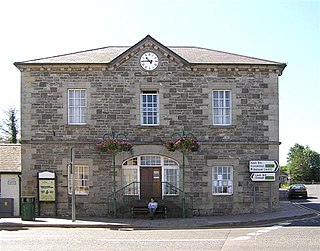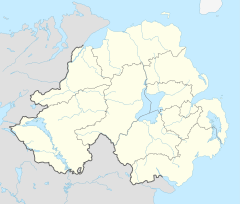Ederney (from Irish Eadarnaidh, meaning 'middle place/place between')[1] is a village situated primarily in the townlands of Drumkeen[2] and of Ederny[3] in County Fermanagh, Northern Ireland.
Ederney
| |
|---|---|
 Road junction in Ederney | |
Location within Northern Ireland | |
| Population | 587 (2011 Census) |
| Irish grid reference | H221649 |
| • Belfast | 83 miles |
| District | |
| County | |
| Country | Northern Ireland |
| Sovereign state | United Kingdom |
| Post town | ENNISKILLEN |
| Postcode district | BT93 |
| Dialling code | 02868 |
| UK Parliament | |
| NI Assembly | |
At the 2011 census it had a population of 587.[4] Ederney lies in the Glendarragh River Valley near Lower Lough Erne and Kesh. It is 83 miles (134 km) from Belfast, over 100 miles (160 km) from Dublin and about 16 miles from both Omagh and Enniskillen. The village and its hinterland (the Glendarragh Valley area) has a population of several thousand.[5]
Ederney is located on a tourist route adjacent to Lough Erne. It is approximately 7 miles (11 km) from the border with the Republic of Ireland and 24 miles (39 km) from the west of Ireland tourism trail, the Wild Atlantic Way, in County Donegal.
Public transport
Ulsterbus route 194 serves Ederney with one daily journey in each direction except Sundays, linking it to Irvinestown, Enniskillen and Pettigo. Route 83A provides a link to Omagh on Mondays & Thursdays only.[6]
History
Local historian Leo Mulligan MBE details that at the time of the Plantation of Ulster there was a settlement of significance at Ederny when the land grant (titled "Edernagh") was given to Captain Thomas Blennerhassett of Norfolk in 1610. He created the Manor of Edernagh on a 450 acres (1.8 km2) demesne and a court baron on the shores of Lough Erne, which he later named Castle Hassett. He established the new village of Ederny (Edernagh).[7][8]
By 1797, the settlement is recorded in the Topographia Hibernica as Ederny Bridge and "fair days" were held there.[5][9]
Built heritage


One of the principal buildings in the village is Ederney Town Hall, locally styled as the "Townhall", erected in 1839.[10] It remains in use as a village community centre.[5]
Another local landmark is Drumskinny stone circle. Drumskinny (from Irish Droim Scine 'knife ridge') is the site of a stone circle in the nearby townland of Drumskinny.[11] The site consists of 39 stones set in a circle. The arrangement is reportedly related to the seasons, moon and sun, and dates from the Bronze Age.[12][13]
Sport
The village has a Gaelic football club, Ederney St Joseph's.
Demographics
As of the 2011 census, there were 587 people living in Ederney.[4] Of these:
- 17.21% were aged under 16 years and 18.91% were aged 65 and over
- 50.6% of the population were male and 49.4% were female
- 82.11% were from a Catholic background and 15.5% were from a Protestant background
At the 2021 census, 553 people were living in Ederney. According to the 2021 census, Ederney had the highest proportion of residents who spoke Irish daily in County Fermanagh with 3.99%, which was higher than the average across Northern Ireland (of 2.43%).[citation needed]
Notable people
- Michael Barrett (1841–1868), Fenian and last man to be publicly hanged in Britain.[14]
- Martin McGrath (b.1981), inter county Gaelic footballer who was one only three Fermanagh players to win a GAA All Star award.[15]
See also
References
External links
Wikiwand in your browser!
Seamless Wikipedia browsing. On steroids.
Every time you click a link to Wikipedia, Wiktionary or Wikiquote in your browser's search results, it will show the modern Wikiwand interface.
Wikiwand extension is a five stars, simple, with minimum permission required to keep your browsing private, safe and transparent.

